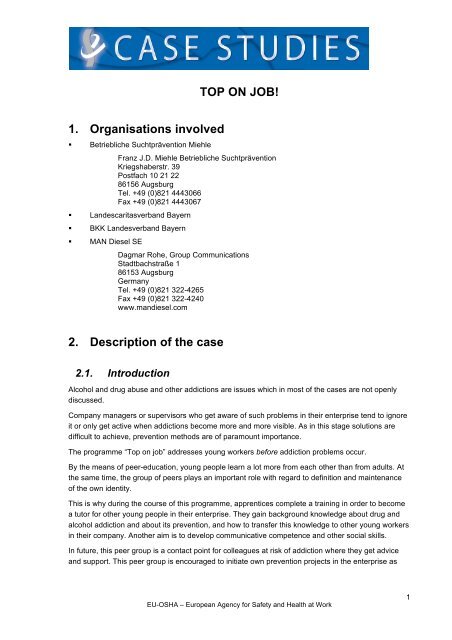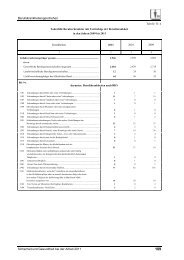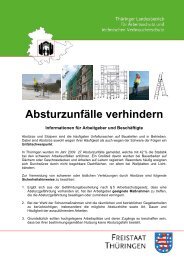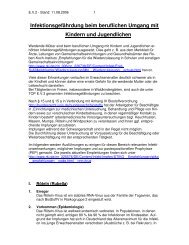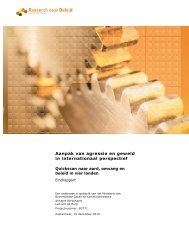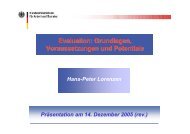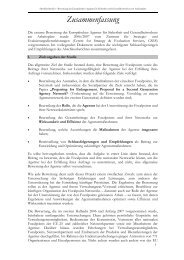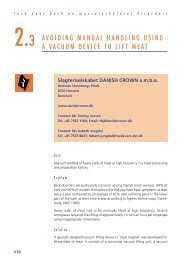TOP ON JOB! - European Agency for Safety and Health at Work
TOP ON JOB! - European Agency for Safety and Health at Work
TOP ON JOB! - European Agency for Safety and Health at Work
Create successful ePaper yourself
Turn your PDF publications into a flip-book with our unique Google optimized e-Paper software.
1. Organis<strong>at</strong>ions involved<br />
Betriebliche Suchtprävention Miehle<br />
<strong>TOP</strong> <strong>ON</strong> <strong>JOB</strong>!<br />
Franz J.D. Miehle Betriebliche Suchtprävention<br />
Kriegshaberstr. 39<br />
Postfach 10 21 22<br />
86156 Augsburg<br />
Tel. +49 (0)821 4443066<br />
Fax +49 (0)821 4443067<br />
L<strong>and</strong>escaritasverb<strong>and</strong> Bayern<br />
BKK L<strong>and</strong>esverb<strong>and</strong> Bayern<br />
MAN Diesel SE<br />
Dagmar Rohe, Group Communic<strong>at</strong>ions<br />
Stadtbachstraße 1<br />
86153 Augsburg<br />
Germany<br />
Tel. +49 (0)821 322-4265<br />
Fax +49 (0)821 322-4240<br />
www.m<strong>and</strong>iesel.com<br />
2. Description of the case<br />
2.1. Introduction<br />
Alcohol <strong>and</strong> drug abuse <strong>and</strong> other addictions are issues which in most of the cases are not openly<br />
discussed.<br />
Company managers or supervisors who get aware of such problems in their enterprise tend to ignore<br />
it or only get active when addictions become more <strong>and</strong> more visible. As in this stage solutions are<br />
difficult to achieve, prevention methods are of paramount importance.<br />
The programme “Top on job” addresses young workers be<strong>for</strong>e addiction problems occur.<br />
By the means of peer-educ<strong>at</strong>ion, young people learn a lot more from each other than from adults. At<br />
the same time, the group of peers plays an important role with regard to definition <strong>and</strong> maintenance<br />
of the own identity.<br />
This is why during the course of this programme, apprentices complete a training in order to become<br />
a tutor <strong>for</strong> other young people in their enterprise. They gain background knowledge about drug <strong>and</strong><br />
alcohol addiction <strong>and</strong> about its prevention, <strong>and</strong> how to transfer this knowledge to other young workers<br />
in their company. Another aim is to develop communic<strong>at</strong>ive competence <strong>and</strong> other social skills.<br />
In future, this peer group is a contact point <strong>for</strong> colleagues <strong>at</strong> risk of addiction where they get advice<br />
<strong>and</strong> support. This peer group is encouraged to initi<strong>at</strong>e own prevention projects in the enterprise as<br />
EU-OSHA – <strong>European</strong> <strong>Agency</strong> <strong>for</strong> <strong>Safety</strong> <strong>and</strong> <strong>Health</strong> <strong>at</strong> <strong>Work</strong><br />
1
well as to collabor<strong>at</strong>e with local addiction aid institutions. The young people mainly work<br />
autonomously; however, they can refer to external advisors in case of problems.<br />
The programme focuses on the consumption of alcohol. In the future, it is also planned to address the<br />
issue computer game/internet addiction.<br />
2.2. Aims<br />
General aim:<br />
To prevent addiction in the company<br />
For apprentices:<br />
To develop a competence to consume alcoholic beverages <strong>and</strong> medicines moder<strong>at</strong>ely <strong>and</strong> to<br />
abstain from illegal substances<br />
Personality building (health awareness, communic<strong>at</strong>ion skills, conflict h<strong>and</strong>ling skills, ability to<br />
work in teams, sense of responsibility etc.)<br />
For the company (<strong>and</strong> managers, trainers, supervisors):<br />
To cre<strong>at</strong>e awareness regarding addiction problems in the company<br />
Thus to prevent losses through non-productive time caused by addiction<br />
2.3. Wh<strong>at</strong> was done, <strong>and</strong> how?<br />
In the course of the tutor training, apprentices pass a training (containing four learning modules of 60<br />
hours in total) where they gain professional competence with regard to peer work. Afterwards, they<br />
take part in three advanced training courses <strong>for</strong> coaching <strong>and</strong> project monitoring. The training takes<br />
place on Fridays <strong>and</strong> S<strong>at</strong>urdays, thus partly in work <strong>and</strong> in leisure time.<br />
In the time between the courses, the apprentices work in the peer projects in their enterprise. After<br />
the end of the training, they receive a tutor degree.<br />
Course topics:<br />
Knowledge transfer<br />
Primary <strong>and</strong> secondary prevention<br />
Mechanism of action <strong>and</strong> effects of the addictive substances<br />
Course <strong>and</strong> effects of the addictive disorder<br />
Supportive systems<br />
Self-awareness<br />
Motiv<strong>at</strong>ion <strong>and</strong> <strong>at</strong>titude check<br />
Consider<strong>at</strong>ion of protective <strong>and</strong> destructive shares of own personality<br />
Identific<strong>at</strong>ion of own chances <strong>and</strong> limits<br />
Activ<strong>at</strong>ion of own resources<br />
Practical orient<strong>at</strong>ion<br />
Personal approach<br />
In<strong>for</strong>m<strong>at</strong>ion<br />
EU-OSHA – <strong>European</strong> <strong>Agency</strong> <strong>for</strong> <strong>Safety</strong> <strong>and</strong> <strong>Health</strong> <strong>at</strong> <strong>Work</strong><br />
2
Moder<strong>at</strong>ion of discussions<br />
Public rel<strong>at</strong>ions in the company<br />
Cooper<strong>at</strong>ion with internal <strong>and</strong> external function owners<br />
Implement<strong>at</strong>ion <strong>at</strong> MAN Diesel<br />
MAN Diesel is the world’s leading provider of large-bore diesel engines <strong>for</strong> marine <strong>and</strong> power plant<br />
applic<strong>at</strong>ions. The company designs two-stroke <strong>and</strong> four-stroke engines, gener<strong>at</strong>ing sets,<br />
turbochargers, CP propellers <strong>and</strong> complete propulsion packages th<strong>at</strong> are manufactured both by MAN<br />
Diesel <strong>and</strong> its licensees. The engines have outputs ranging from 450 to 97,300 kW of power. MAN<br />
Diesel employs over 7,700 staff, primarily in Germany, Denmark, France, the Czech Republic, India<br />
<strong>and</strong> China. The global after-sales organis<strong>at</strong>ion, MAN Diesel PrimeServ, comprises a network of the<br />
company’s own service centres, supported by authorised partners.<br />
The MAN training centre is the largest in Bayrisch-Schwaben, Germany, where around 480 young<br />
people are learning an industrial-technical profession. 162 started their training in September 2009.<br />
Since years, over 90 percent of the apprentices are hired by MAN after the completion of their<br />
training. MAN training centre offers 14 recognised occup<strong>at</strong>ions requiring <strong>for</strong>mal training plus a degree<br />
programme in mech<strong>at</strong>ronics in cooper<strong>at</strong>ion with Fachhochschule Augsburg.<br />
The “Top on Job” training <strong>for</strong> the MAN Diesel apprentices comprised two theoretical training moduls<br />
of two days each, <strong>and</strong> three full days of practical coaching.<br />
Training module I<br />
The focus of the two-day training modul was layed on the basic knowledge about all <strong>for</strong>ms of<br />
addiction <strong>and</strong> addictive behaviour. The apprentices learned to reflect their needs <strong>and</strong> their own<br />
behaviour with regard to addiction. The chances <strong>and</strong> limits of being a tutor were discussed, <strong>and</strong> the<br />
supportive networks inside <strong>and</strong> outside the company were presented. The content of the training was<br />
backed up by role plays <strong>and</strong> exercises. Finally, the apprentices organised into project teams <strong>for</strong> future<br />
activities with the following topics:<br />
Prepar<strong>at</strong>ion of a flyer <strong>for</strong> the fellow apprentices<br />
The work of a tutor<br />
Risks of drug/alcohol consumption <strong>and</strong> possible consequences <strong>for</strong> the voc<strong>at</strong>ional training<br />
Internal assistance facilities<br />
External assistance facilities<br />
Coaching meeting I<br />
During this meeting, the apprentices had the chance to get to know the local drug advisory service of<br />
Caritas, as well as two addiction prevention projects <strong>for</strong> adolescents <strong>and</strong> adults. The possibilities of<br />
cooper<strong>at</strong>ion were discussed. Furthermore, the apprentices learned more about illegal drugs <strong>and</strong> their<br />
effects <strong>and</strong> risks. For this purpose, they were shown a film about addiction prevention. Finally, the<br />
prospective tutors designed an internal flyer about the project.<br />
EU-OSHA – <strong>European</strong> <strong>Agency</strong> <strong>for</strong> <strong>Safety</strong> <strong>and</strong> <strong>Health</strong> <strong>at</strong> <strong>Work</strong><br />
3
Coaching meeting II<br />
The second coaching meeting started with the reports of the project teams who organised their own<br />
activities. The apprentices’ basic knowledge about being a tutor was broadened <strong>and</strong> backed up by<br />
role plays regarding different situ<strong>at</strong>ions, <strong>for</strong> example in voc<strong>at</strong>ional school or in leisure time. Contacting<br />
the network inside <strong>and</strong> outside the company was another important module of the coaching. The<br />
training was completed with hints how to conduct a convers<strong>at</strong>ion with persons with probable addiction<br />
problems.<br />
Coaching meeting III<br />
The project teams again presented an upd<strong>at</strong>e of their projects. Afterwards, the prospective tutors<br />
prepared a present<strong>at</strong>ion <strong>for</strong> their fellow apprentices. For th<strong>at</strong> purpose, they were asked to reflect on<br />
the tasks of a tutor, on the conditions in their company <strong>and</strong> on the reasons of drug use. Again, role<br />
plays were used to consolid<strong>at</strong>e the knowledge achieved. Finally, a film project in the training centre<br />
was prearranged.<br />
Training module II<br />
On the first day of this two-day training, the apprentices presented their final project reports. They<br />
appointed a tutor spokesman, <strong>and</strong> got to know the addiction appointees <strong>at</strong> MAN Diesel <strong>and</strong> the<br />
apprentices’ advisor. A highlight of the prospective tutors’ schedule was the visit to a clinic <strong>for</strong><br />
adolescents <strong>and</strong> adults addicted to drugs. Finally, an internal day of action <strong>for</strong> the other apprentices<br />
was organised.<br />
The second day started with a personality building exercise. In the following, the apprentices<br />
presented their flyers. In order to be thoroughly prepared to act as a tutor in their company, they<br />
screened the available work m<strong>at</strong>erial <strong>and</strong> wh<strong>at</strong> was prepared <strong>for</strong> the film project. The prospective<br />
tutors also discussed the question how they will act with regard to addictive substances themselves.<br />
In this context, they worked out common rules. The training modul was concluded with a roundtable<br />
meeting where the apprentices filled in a feedback questionnaire, <strong>and</strong> with the grant of the tutor<br />
certific<strong>at</strong>es.<br />
2.4. Wh<strong>at</strong> was achieved?<br />
MAN Diesel Company agreement “Betriebliche Suchtprävention” (addiction prevention <strong>at</strong> the<br />
workplace)<br />
A document<strong>at</strong>ion including a report, photos <strong>and</strong> a film with MAN Diesel<br />
A sustainable addiction prevention through peer work: the apprentices keep working in the peer<br />
projects <strong>and</strong> act as tutor <strong>for</strong> other apprentices<br />
The final evalu<strong>at</strong>ion showed th<strong>at</strong> after the training, the majority of tutors employ a more<br />
responsible use of alcohol <strong>and</strong> drugs; some even st<strong>at</strong>e th<strong>at</strong> they now totally abstain from<br />
alcohol. In any case the tutors st<strong>at</strong>e th<strong>at</strong> they are more sensitive with regard to the subject.<br />
Some of them also said th<strong>at</strong> the issue alcohol/drug addiction has been raised more often than<br />
be<strong>for</strong>e in their circle of friends, <strong>and</strong> their view on alcohol/drug consumption has become more<br />
critical.<br />
EU-OSHA – <strong>European</strong> <strong>Agency</strong> <strong>for</strong> <strong>Safety</strong> <strong>and</strong> <strong>Health</strong> <strong>at</strong> <strong>Work</strong><br />
4
2.5. Success factors<br />
Precondition <strong>for</strong> a successful peer to peer prevention work is a basic interest <strong>and</strong> a positive <strong>at</strong>titude of<br />
the tutor towards the subject addiction prevention. He/she should be interested in working with peers;<br />
he/she also needs mental <strong>and</strong> physical resilience. The support of trainers, colleagues <strong>and</strong><br />
supervisors is crucial, as well as communic<strong>at</strong>ion opportunities with other tutors. It is also necessary to<br />
offer supervision <strong>and</strong> advanced training <strong>at</strong> regular intervals.<br />
At MAN Diesel, all responsible persons have been successfully involved (training managers,<br />
company physician, works council etc.). Another success factor can be seen in the team-building<br />
measures which cre<strong>at</strong>ed a strong bond between the apprentices.<br />
2.6. Further in<strong>for</strong>m<strong>at</strong>ion<br />
The project concept was also implemented by another German company, Brose Fahrzeugteile GmbH<br />
& Co. KG <strong>at</strong> Coburg. Project responsible was head of training Michael Stammberger, (tel.: +49 9561<br />
21 0).<br />
2.7. Transferability<br />
The idea to train apprentices in taking responsibility <strong>for</strong> their peer group <strong>and</strong> other colleagues with<br />
regard to addiction is something th<strong>at</strong> can be easily implemented in any other company. It is even<br />
imaginable to extend this approach to other topics (other than addiction prevention): apprentices<br />
could also be tutors in the field of stress, conflict management, workplace bullying etc.<br />
3. References, resources:<br />
Betriebliche Suchtprävention Miehle (Franz J.D. Miehle Betriebliche Suchtprävention)<br />
http://www.suchtpraevention-miehle.de/<br />
MAN Diesel SE, http://www.m<strong>and</strong>iesel.com<br />
EU-OSHA – <strong>European</strong> <strong>Agency</strong> <strong>for</strong> <strong>Safety</strong> <strong>and</strong> <strong>Health</strong> <strong>at</strong> <strong>Work</strong><br />
5


